Fellow parents, I know it can be very staggering when your child is diagnosed on the autism spectrum. It will take time to access and figure out the next steps and that is OK! The spectrum is huge, variations vast and many assessments of the child’s struggles should and will be done. During these times others will be focusing on the weaknesses and this can be very emotionally draining for you and your family.
One thing that I do to help myself during these draining times is to make a list of goals that I would like to accomplish. Doing this helps me have some stepping stones, helps me feel like I am making some progression on the giant pile of things encompassing me. When looking at this list, I tell myself to remember, I will not be taking them all on at once, doing this would make it impossible!
I feel the same about throwing to many things at my daughter. We have a huge list to tackle but need to work on it slowly and continually adjusting when needed. At the top of the list of things we are working on this year is her struggle to easily verbally communicate her wants and needs. She has a huge desire to express herself but often has a hard time doing it. We often have meltdowns during these times and this is when I think of the things I need to do at that moment.
When someone is diagnosed on the spectrum, the doctor will not refer to them as nonspeaking, better said they are diagnosed with struggles to communicate. In other words, they are unable to verbalize their wants in the same manner as a Nero-typical person. However, with the right support, a nonspeaking autistic person can become a strong communicator, with or without verbal language. Communication is not simply words, it is also, hand gestures, eye contact, facial expressions, sign language, speech tablets, flashcards and pictures.
Recently I listened to an audio book titled “The Reason I Jump” by The inner voice of a thirteen-year-old boy with autism. So many of the things he said hit me hard and helped me understand my daughters inner struggles a little better. He is unable to verbally communicate but writes and reads well using other technical assistance. Communication wise he has some key words he can verbally say but also sings with echolalia often which is the repetition of words. Repetition being something Brooklyn does all day long.
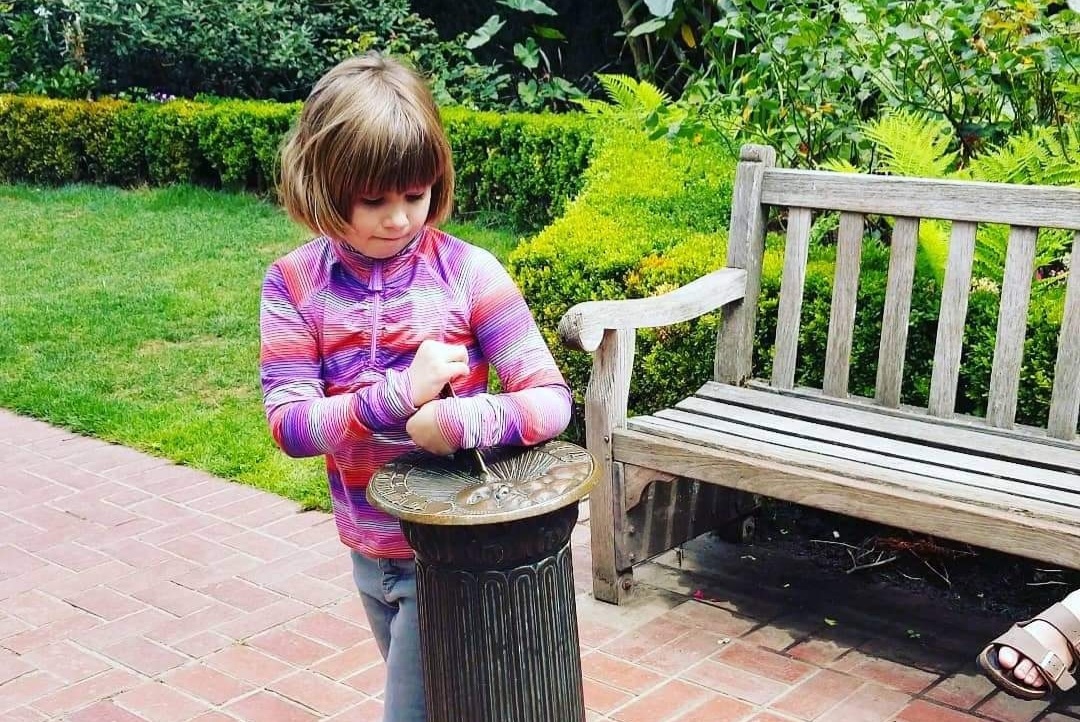
The things I found to be the most intriguing are the way he feels in moments that he is unable to express himself. It is honestly, heartbreaking but also explains why things may happen and how we can better lay hold of why they do. Knowing more will make us even bigger voices for our children, a pertinent thing. I did shorten some of the statements but are still the key portions of his response. The first one made this mother cry and wonder if this is how my wild child feels. Imagine the feeling of spending your life in isolation.
- Are you happy to be able to communicate? “At first I never dreamed I could make it work, but now I’m well able to express my true self using only a computer and an alphabet grid. This is an incredible feeling! Not being able to share what you are feeling and thinking. It’s like being a doll spending your whole life in isolation, without dreams and without hopes.”
- Do you find childish language easier to understand? “Children with autism are also growing and developing every single day, yet we are forever being treated like babies. I guess this is because we seem to act younger than our true age, but whenever anyone treats me as if I’m still a toddler. True compassion is about not bruising the other person’s self-respect.”
- Why do you ask the same questions over and over? “I quickly forget what it is I’ve just heard. My memory, however, is more like a pool of dots. I’m always picking up these dots-by asking my questions-so I can arrive back at the memory that the dots represent. Another reason for repeated questioning: it lets us play with words.”
- “Why do people with autism talk so loudly and weirdly? “When I am talking in a weird voice, I’m not doing it on purpose. Sure, there are sometimes when I find the sound of my own voice comforting when I’ll use familiar words or easy-to-say phrases. I’d be okay with my weird voice on my own, but I’m aware that it bothers other people. How often have the strange sounds coming out of my mouth embarrassed me nearly to death? Honest, I want to be nice and calm and quiet too! But even if we’re ordered to keep our mouths shut or to be quiet, we simply don’t know how. Our voices are like our breathing, I feel, just coming out of our mouths, unconsciousness.
- “Why do you find your speech can sound a bit different at times? When there’s a gap between what I’m thinking and what I’m saying, it’s because the words coming out of my mouth are only ones I can access at that time. These words are either available because I’m always using them or because they left a lasting impression on me at some point in the past.”
- Why do you ignore us when we’re talking to you? Even if someone is right here in front of me, I still don’t notice when they’re talking to me.” ” Not noticing,” however, is not the same as “deliberately ignoring. So it would help us a great deal if you could just use our names first to get our attention before you start talking to us.”
Brooklyn definitely has many of the above characteristics and we have made sure to adapt our communication according to the circumstance at hand. Just remember, we all have our days that we struggle more than others, so we have to accommodate accordingly. The tired days, not feel good days, and last but not least I can’t take this anymore days are the toughest.
I have noticed the last few years that Brooklyn has not had quite as many melt downs and overwhelming moments, but they do still happen. I find it imperative that when these hard moments hit I use a verbal communication that stays calm and consistent. This is the key, to ensure I don’t amplify the situation, instead it gives me a cleared mind to access what is triggering the moment on hand. Keeping calm helps me as well, I can better differentiate between a tantrum and a meltdown if I am not having one myself. Tantrums can be resolved through a certain kind of response. While the same response can be way to much for a child during a meltdown. So, differentiating the moment on hand is imperative.
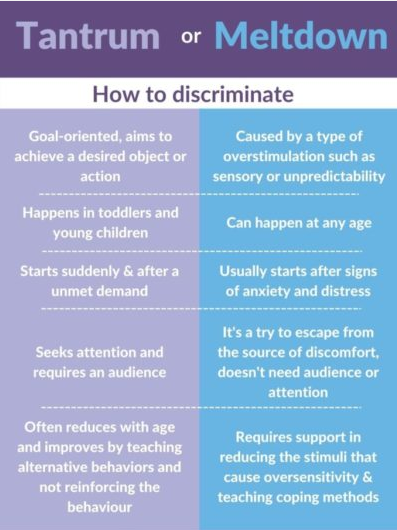
Some of the more common reasons a child will have a meltdown verses a tantrum are sensory, emotional, or informational overload. As a parent, staying calm and absorbing what is happening during these moments will help you know what steps to take. Just try to remember that not every person is the same, not all children will have a meltdown but can still have struggles and other ways of showing they are having a tough moment. Some of these signs could be:
- Extreme exhaustion
- Zoning out (very still)
- Moving to a quieter more isolated area
- Unresponsiveness
- Irritability
- Verbal skills can regress
I have experienced all of these struggles with Brooklyn and slowly have learned what helps her get through those hard moments.The tiredness of her brain after a long day at school is understandable and often can be a trigger. So, when she is off the bus this is the time for her to decompress. She grabs her iPad, sits at the table, and tells me to go away. As a loving mother I reply with a quick request for a hug and kiss, she gives in and then pushes me softly away from her. I try to think of it if I had just came home from a stressful day at work. A little quiet alone time to reboot my brain would be wonderful and sometimes a requirement. When our brains are tired it is even more difficult for our frontal lobe to form the words we may want to say. I know this feeling well.
I am delighted to say that Brooklyn is slowing gaining more words to her vocabulary and often surprises me with a three word phrase or a simple one word reply that was not expected. These are astonishing moments and make me want to keep pushing her speech progression even more.
- Make Animal noises
- Teach Them The Essential Words
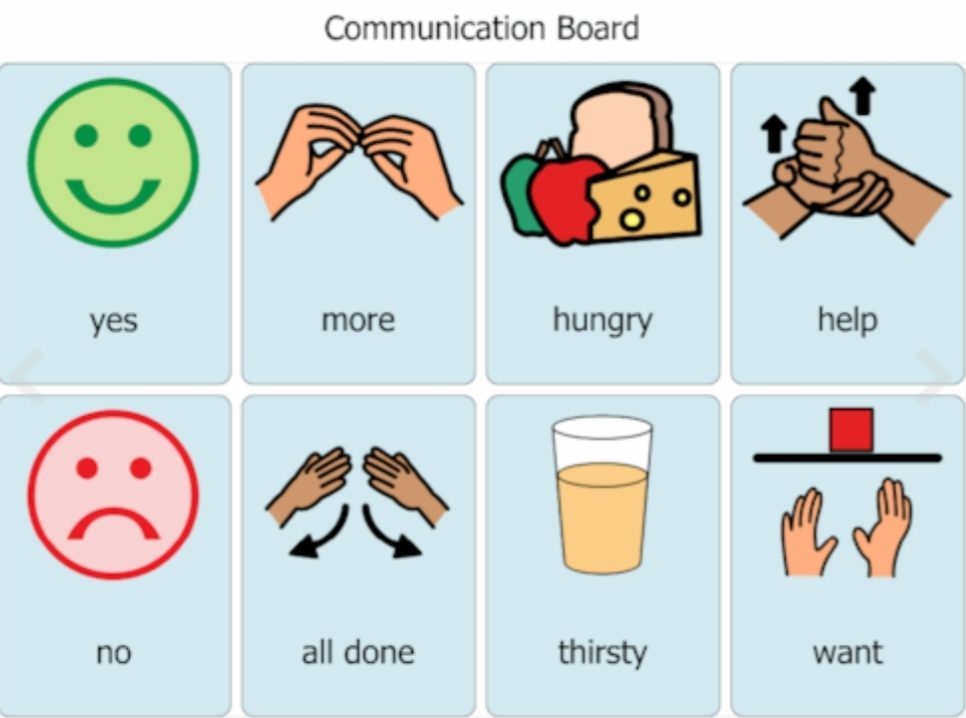
- Use their Favorite Toys and Snacks
- Provide Positive Reinforcement
- Present Them With Multiple Choices
- Play Sorting Games
- Read Short Stories With Your Kid
- Use Communication Boards
Some of the things below we incorporate regularly into our life and Brooklyn very much enjoys all of them. Click the green!
- Gemiini Speech program– this wonderful program puts visual mouth movements with pictures. Helping the child watch the movements and see what the word goes with. The monthly cost is a little expensive but have found it to be very helpful. They do have a low income option to apply for as well.
- Alphabet Jolly Phonics | Sounds and Actions -this video gives great visuals and my daughter watches it often.
- Article about using a AAC device -this article explains different options on AAC communication devices and what to consider. A great resource which we have implemented into Brooklyn’s daily school life.
A big question I asked my daughters speech therapist, is why should we use a communication device? What does this offer her verses continually learning new words with the help of us? It has been found that when a child has a visual and an auditory stimulation that it is more likely that the word will make it to the long term memory side. Progression of children in there speech has been shown to improve significantly even when given access to a speech pad. Just because they can push the word does not mean they don’t want to say it. The more they see and hear the better the outcome. Repetition and incorporating into your day will only help those words move to the mouth a little faster.
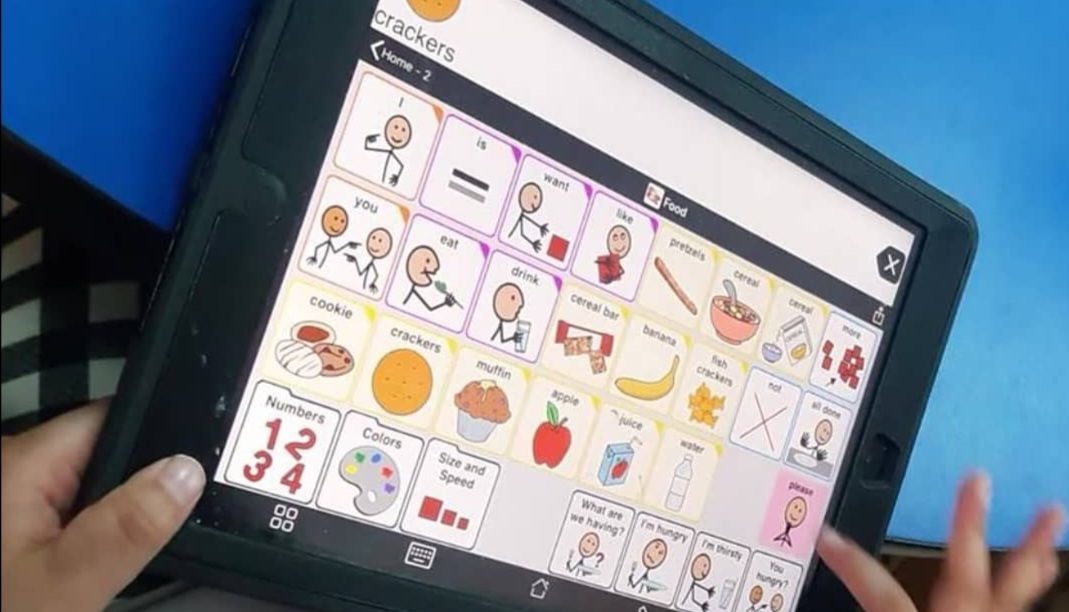
Why would the speech-generating devices help? They have no clear answer why, but it may be the speech sounds produced by the device help provide the child with a model for imitation. Many of these devices pair pictures with sounds. This helps reinforce the sound of the word with the child’s mental representation of the object or activity. Regardless of why these speech pads help the proof is they do. They encourage communication with others and give a good model of the sounds that they need to imitate. We have a device for my daughter but is a little more complex than I think is needed. We will be meeting soon with her speech therapist to access the program we are using and see if a change is needed. Change is difficult but often very needed.
In conclusion, I ask that you think about the moments that you can relate to what a person feels like when they can’t seem to find the words they wish to articulate, they are just mumbled, or somehow just can’t be found. When this happens to me I often just cringe and fight hard to find that long lost word but after these periods I mentally process how difficult it is for my daughter. Can you imagine constantly, all-day, everyday, wanting, needing and hoping your words will make it out clearly? I focus on this thought everyday and it is what pushes me to continually help Brooklyn find a way to express herself. Love, patience, focus and determination are inside us all! We got this!!!

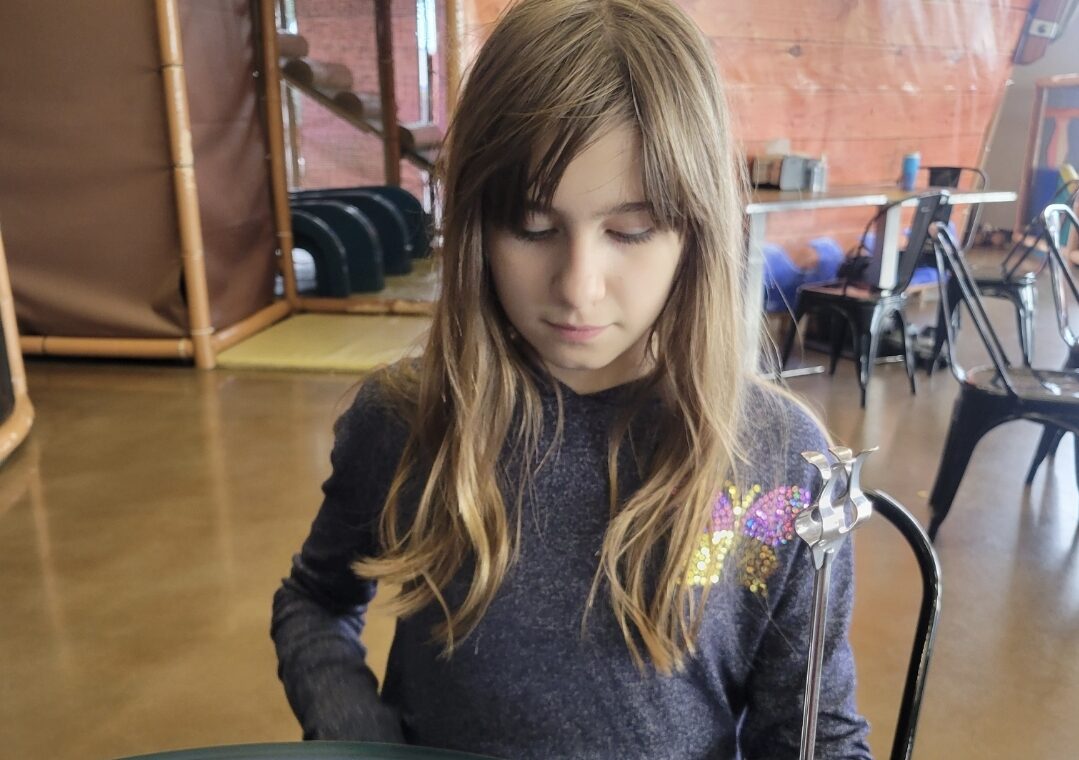
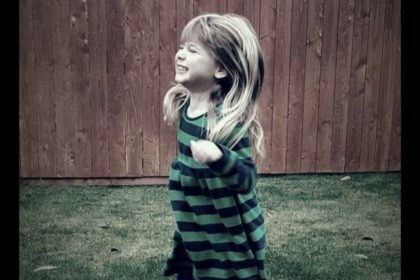


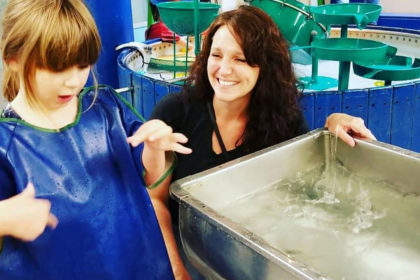
Thx